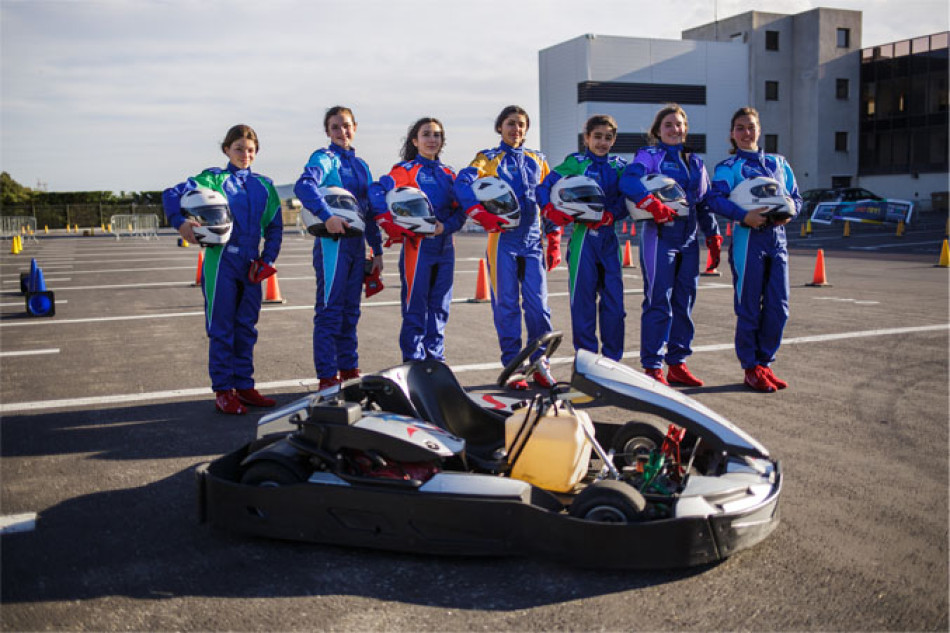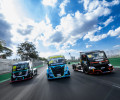AUTO #29 - Equal to challenge
Designed to increase female participation in every area of competition, FIA Women in Motorsport recently celebrated its 10th anniversary. Commission President Michèle Mouton looks back at what has been achieved and explains why the future is bright.

By its very nature as a pursuit that in large part sets aside brute physicality in favour of speed of thought and deed, motor sport is something of a great leveller in the world of sport, a discipline that ideally remains ignorant of race, colour, creed or indeed gender. In machinery of equal potency, equality should be a given.
The truth, though, is that motor sport has been traditionally seen as something of a ‘boys’ club’, an arena in which women have often been marginalised and on occasion actively discouraged from participation.
In 2009, the FIA set out to change that paradigm by launching its Women in Motorsport Commission, a body tasked with creating “a sports culture that facilitates and values the participation of women in all aspects of motor sport”.
In the past decade the Commission has been involved in a wide variety of projects in every area
of motor sport activity, developing programmes to advance female participation on track – in disciplines ranging from karting and single-seater racing to cross country rallying and sports cars – and off track through initiatives to raise awareness of the huge diversity of industry roles to women in engineering, design, logistics, promotion, administration, and marketing and communications.
Throughout its first decade of existence, the Commission has been presided over by 1982 FIA World Rally Championship vice-champion Michèle Mouton. And the four-time WRC rally winner is certain that the Commission has helped to make motor sport more inclusive in that time.
“We have reached the 10th anniversary of the Women in Motorsport Commission and I feel proud of our achievements and the collaborations we now have with many of the stakeholders in the sport,” she says. “These 10 years have flown by and while we are always pushing for greater progress, I believe the foundations we started to lay at our first meeting in early 2010 have provided a solid base from which we are now reaping rewards.
“Our work is ongoing and our mission hasn’t changed over the years, but the momentum has built steadily and now I sense a real change in the perception of women in the sport and the opportunities available to them,” she adds. “Everyone associated with our Commission, as well as all the national sporting authorities and stakeholders who support our activities, are helping us to realise our objectives and some of the dreams we had back in the early days are now becoming a reality. That is immensely satisfying.”
When the Commission was in its infancy one of the key targets was to encourage greater female participation in karting, the gateway to motor sport competition for countless champions in almost every discipline. At the time Mouton insisted that: “karting is the grassroots of motor sport. Awarding a trophy to a promising young girl is a symbol of encouragement for more girls to persevere and not simply a reward for a purely feminine achievement.”
The first steps towards that goal were taken by the support of female racers in the CIK-FIA Karting Academy Trophy, a contest designed to attract youngsters aged between 12 and 14 to the sport.
In 2014, however, the Commission’s ambition for wider female involvement in karting grew significantly with the development of a planned Europe-wide karting talent search. And in 2018 the plans came to fruition with the launch of the FIA European Young Women Programme. Part-funded by the EU Erasmus+ programme, The Girls on Track initiative initially encompassed a two-year project based around a cost-effective, arrive and drive karting slalom format whereby a small Tarmac area in a central urban location would be set up with marker cones to create a slalom course.
Partnered by eight European national sporting authorities and CDES-PROGESPORT at the University of Limoges in France, the initiative staged 22 events across nine countries. Following the national events a six-strong European Team was selected in the final at Le Mans. From there, the team attended two driver training camps to help enhance their careers in the intense world of motor sport.
For Mouton, the Girls on Track project has been one of the major success stories of the Commission’s first decade.
“Girls on Track was a hugely ambitious project requiring significant funding and concrete support from our ASNs. It was a vision, but I knew we could achieve it; if we wanted to make progress, we had to,” she says. “We introduced more than 1200 young girls to the motor sport world and showed them what opportunities were potentially open to them as career options.”
OPENING DOORS
The success of Girls on Track has led to the initiative being continued and expanded. Partnering with the Dare to be Different programme launched by former Formula 1 test driver and current Formula E team principal Susie Wolff, the first FIA Girls on Track – Dare to be Different event took place in Mexico City in February 2019, during the weekend of the Formula E race in the city. A second event took place at the FE round in Berlin last May and in November the initiative staged a first-of-its-kind event at the opening round of the 2019/2020 Formula E season at Diriyah in Saudi Arabia.
“We have received enormous support from the Formula E community and its promoter, enabling us to also host events at their high-profile city centre races,” adds Mouton. “More and more ASNs have been inspired to run their own Girls on Track activities and if this programme can be implemented around the world, that is a significant amount of young girls we can reach and potentially get involved in our sport. With a lot of hard work and support from many people and organisations, our vision came true and we are convinced that focusing on the grassroots level is where we can increase our base of female participation across many areas of the sport.”
It’s not just at grassroots level that the Commission has been active. Over the past decade it has sought to boost female participation at the top levels of motor sport and as well as a 2016 talent search in cross country rallying organised in partnership with the Qatar Motor and Motorcycle Federation (QMMF), the Commission has supported a number of rising female drivers in rallying and circuit racing. The Commission president believes that the world of endurance racing offers a strong possibility of top-level success too.
“Our dream of getting female racers onto the top step of the podium at Le Mans is getting ever closer,” she says. “We have highly competitive drivers in Europe and America competing in top teams and achieving great results. Endurance racing is a discipline where women are making a mark, and I am so pleased that with the support of manufacturers we are now in a position to help open doors and create real opportunities for them. There is more to come very soon in this discipline.”
It’s not just in GT racing that Mouton believes success will come, however, and with a decade of investment in female empowerment now behind the Commission, its president is sure that rich dividends will start to flow in the coming years.
And as evidence of changing perceptions within motor sport she points to the results of the first female driver assessment undertaken by the FIA in August 2018.
Held at the Circuito Navarra in Spain, the assessment saw the Women in Motorsport Commission work together with the FIA Drivers’ Commission to analyse the performance of 25 female drivers currently competing in a wide variety of circuit racing categories.
“After our first female driver assessment we had concrete data about the performance level of 25 drivers,” says Mouton. “This put us in a position to talk seriously to championship promoters and manufacturers and, by working together, we have been able to create opportunities for these women. The support we are receiving is fantastic, with more manufacturers talking to us about potential future test and race seats.
“It is important we maintain and increase this momentum and support the drivers wanting to take that next step. The creation of a talent development pathway is therefore vital to our ongoing plans and an initiative we intend to launch in the very near future.”
FIA European Young Women programme yields positive outcomes
The FIA’s two-year-long European Young Women Programme, ‘The Girls on Track Karting Challenge’, concluded in October 2019 with a closing conference at the headquarters of the EU Commission in Brussels where key outcomes of the EU Erasmus+ supported initiative were presented. As part of the project the FIA partnered with CDES-PROGESPORT at the University of Limoges to conduct a detailed analysis of the programme’s impact, most notably through a sociological survey as well as through the development of a set of recommendations to the sport’s stakeholders and public institutions on how to challenge gender stereotypes around sport and better promote equality. The central survey revealed positive feedback from participants, who reported a 96.4 per cent satisfaction rate for the 22 national karting challenge events organised by the FIA and the initiative’s nine national sporting organisation partners. An impressive 97.4 per cent believed such events had strong potential to encourage more girls to take up motor sport.
However, the survey also revealed the influence of an early acquaintance with motor sport in order to overcome the gender stereotypes surrounding it. It also noted a lack of adaptation within motor sport, such as in the provision of facilities and equipment specifically for females. Communication and the promotio of female role models was another key factor to help encourage young girls to the sport. As such, the challenges to be met in order to encourage effective gender equality referred to the conditions of access, the environment surrounding the practice at grassroots level, and more generally to the establishment of sustainable proactive femalefriendly policies and initiatives, such as the FIA European Young Women Programme.
Following a karting demonstration by the six-strong FIA Girls on Track Karting Challenge European Team, the afternoon session of the conference hosted two panel discussions. The first, focusing on making motor sport more accessible for women at grassroots level, featured Anssi Kannas, Secretary General of Finland’s AKK-Motorsport, Milja Kukkonen, a member of the Girls on Track Karting Challenge European Team, Tatiana Calderón, test driver for the Alfa Romeo Racing F1 team, FIA Formula 2 Championship racer and an ambassador to the programme, and Margarita Torres Diez, Trackside Formula One Power Unit
Female sports car crews gear up for 2020 season
The FIA Women in Motorsport Commission’s pursuit of success in GT racing took a step forward for 2020 with the announcement that it would support an all-female line-up in the Daytona 24 Hours (January 24th-26th). Bringing together some of the best female drivers from America and Europe, the GEAR Racing (Girl Empowerment Around Racing) team brought together IMSA and sports car driver Katherine Legge, Alfa Romeo Formula 1 test driver and Formula 2 racer Tatiana Calderón, ‘Iron Dames’ team member and Audi Sport Customer Racing driver Rahel Frey, and IMSA and sports car driver Christina Nielsen, to battle for the top positions in the legendary US race that kicks off the IMSA WeatherTech SportsCar Championship season. GEAR is an organisation devoted to promoting female talent in motor sport.
During 2020, the Women in Motorsport Commission will support three all-female professional teams competing in top-level international series in the United States and Europe. Legge, Calderón and Nielsen will continue with GEAR Racing to contest the full 12-round 2020 IMSA season in a Lamborghini Huracan GT3 Ev.
The Commission will again follow the fantastic line-up for the 2020 European Le Mans Series with Rahel Frey, Michelle Gatting and Manuela Gostner taking part behind the wheel of the Iron Dames Ferrari 488 GTE. And, in addition to their American programme, Katherine and Tatiana will compete in the ELMS with an Oreca 07 in the LMP2 category. “Our next objective,” said Michèle Mouton, Commission President, “is to have two female teams in this year’s Le Mans 24 Hours.”

 Facebook
Facebook Twitter
Twitter






